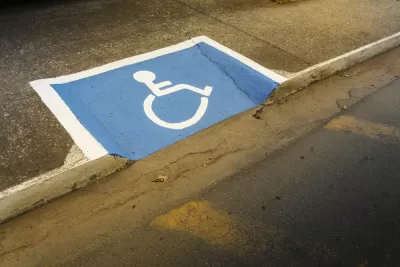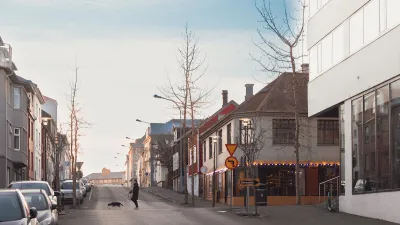Despite the passage of the Americans with Disabilities Act more than 30 years ago, most U.S. cities delay making accessibility improvements to sidewalks until activists bring them to court.

Streetsblog’s Kea Wilson examines why sidewalk accessibility in U.S. cities so often depends on lawsuits filed by mobility advocates despite the existence of the Americans with Disabilities Act (ADA), which ostensibly mandates compliance with accessibility requirements.
As Wilson explains, “Cities like Baltimore, Long Beach, Calif. and Portland, Ore. have all been sued for dangerous sidewalk conditions, but even the suits that advocates win can take decades to translate into real roadway results.”
Of course, funding accessible, complete, and well-maintained networks of sidewalks as the basic civil right they should have always been — and doing it before the lawyers get involved — would make a far greater difference for people with mobility challenges than any lawsuits.
But according to attorney Meredith Weaver, “there are structural reasons why city sidewalk policy can seem so callous — and they help explain why it often takes a multi-year lawsuit to get them to act.” One reason is money, Weaver points out. “I think, given an endless supply of cash, most of them would probably be doing this work already. But without resources, things can fall by the wayside.” Cities end up holding out as long as possible before repairing sidewalks, which would benefit not only people with disabilities but also elderly people, parents with strollers, and anyone with temporary or permanent mobility challenges.
FULL STORY: Why Do People With Disabilities Have to Sue To Get Accessible Sidewalks?

Planetizen Federal Action Tracker
A weekly monitor of how Trump’s orders and actions are impacting planners and planning in America.

Congressman Proposes Bill to Rename DC Metro “Trump Train”
The Make Autorail Great Again Act would withhold federal funding to the system until the Washington Metropolitan Area Transit Authority (WMATA), rebrands as the Washington Metropolitan Authority for Greater Access (WMAGA).

DARTSpace Platform Streamlines Dallas TOD Application Process
The Dallas transit agency hopes a shorter permitting timeline will boost transit-oriented development around rail stations.

San Francisco's School District Spent $105M To Build Affordable Housing for Teachers — And That's Just the Beginning
SFUSD joins a growing list of school districts using their land holdings to address housing affordability challenges faced by their own employees.

Car-Centric LA Suburb Looks to a Train-Oriented Future
City leaders in Rancho Cucamonga, the future western terminus of the Brightline West rail line to Las Vegas, want to reimagine the city as a transit-oriented, pedestrian-friendly community.

New Alaska Bitcoin Mine Would Burn as Much Energy as the State’s Largest Coal Plant
Fueled by “stranded” natural gas, the startup hopes to become the largest in the US, and to make Alaska an industry center.
Urban Design for Planners 1: Software Tools
This six-course series explores essential urban design concepts using open source software and equips planners with the tools they need to participate fully in the urban design process.
Planning for Universal Design
Learn the tools for implementing Universal Design in planning regulations.
Municipality of Princeton
Roanoke Valley-Alleghany Regional Commission
City of Mt Shasta
City of Camden Redevelopment Agency
City of Astoria
Transportation Research & Education Center (TREC) at Portland State University
US High Speed Rail Association
City of Camden Redevelopment Agency
Municipality of Princeton (NJ)





























